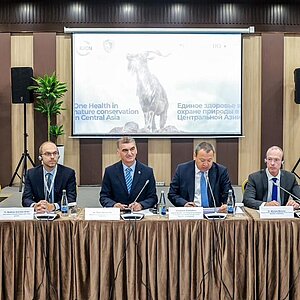Strong regional commitment to One Health approach in Central Asia

The IKI supports the first One Health activities in the region.
Five Central Asian countries have jointly confirmed their interest to mitigate the risk of zoonosis emergence in the region by enhancing overall landscape resilience through the One Health approach.
The commitments were shared at the end of March, closing out a three-day regional workshop in Tashkent, co-hosted by the Ministry of Natural Resources of Uzbekistan and IUCN.
The initial activities related to One Health in Nature Conservation in Central Asia, including the workshop, were delivered in the frame of the IKI project “Enhancing landscape resilience to zoonotic disease emergence by consolidating nature conservation systems”.
“It is well known that biodiversity loss, ecosystem degradation and climate change combined increase the risks of zoonotic disease outbreaks. We are interested to support the coordinated efforts among Central Asian countries to address those risks by raising awareness about the linkages between conservation, ecosystem health and human well-being”, said Aziz Abdukhakimov, Minister of Natural Resources of the Republic of Uzbekistan, addressing the participants in Tashkent.
With the support of IUCN and international partners, national authorities and experts are ready to take steps towards improving the effective governance and management of protected and conserved areas, and build the resilience of both ecosystems and society in facing these crises. The countries are willing to apply the One Health approach together with the IUCN Green List Standard of Protected and Conserved Areas for nature conservation, best practices related to species management and the latest knowledge on zoonosis research and technology.
“The One Health approach is relatively new within the International Climate Initiative (IKI), and we expect that this innovative effort led by IUCN with national and regional partners will set us on the path of understanding the interdependence of nature conservation and biodiversity, climate, human health and livelihoods, to the benefit of people and nature”, stressed Elke Steinmetz, Head of Division of International Cooperation on Biodiversity at the Federal Ministry for the Environment, Nature Conservation, Nuclear Safety and Consumer Protection (BMUV), a partner that is supporting the initial steps made in the region in this regard. “This project will be at the forefront of One Health globally and we are delighted to see how it evolves”, adds Mrs. Steinmetz.

The countries of Central Asia are ready to support designations of new protected areas, improve the effectiveness of existing protected areas, and recognise other effective area-based conservation measures (OECMs) while also looking into management practices and governance mechanisms for these areas. These efforts should result in the conservation outcomes beneficial to people, especially local communities and vulnerable groups, while also contributing to the global 30x30 target of the Convention on Biological Diversity.
National authorities, international partners and key stakeholders on various levels hope to build on the achievements and efforts made by now, aiming to improve national policy frameworks for effective area-based conservation in accordance with the One Health approach, and aligned with the new Global Biodiversity Framework.
This is an edited version of the IUCN press release. The full version can be found here.
The link has been copied to the clipboard
Contact
IKI Office
Zukunft – Umwelt – Gesellschaft (ZUG) gGmbH
Stresemannstraße 69-71
10963 Berlin




